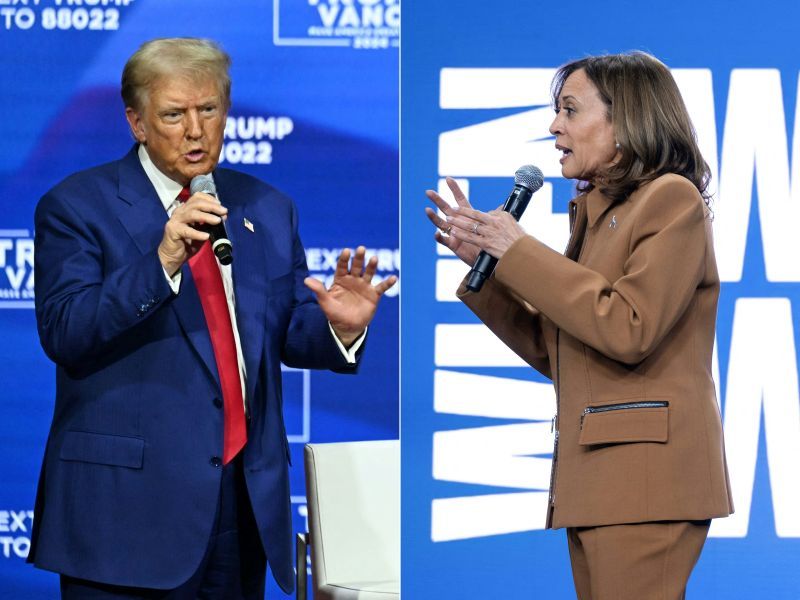- Home
- US Elections
- Trump Favored by Netanyahu and Israelis in US Presidential Election

This combination of images created on October 26, 2024 shows former US president and Republican presidential candidate Donald Trump at Oaks. ©Jim Watson and Brendan Smialowski / AFP
Between Kamala Harris and Donald Trump, Israeli Prime Minister Benjamin Netanyahu will likely bet on the return of the Republican candidate to the White House on November 5, despite uncertainties about future U.S. support for Israel, experts say.
During his campaign, the Republican vowed to ensure that Israel "would no longer face threats of destruction," asserting that the unprecedented Hamas attack on October 7, 2023, in southern Israel, which triggered the war in Gaza, would "never have happened" had he been in power.
He also encouraged the Prime Minister to bomb Iranian nuclear facilities, advice Netanyahu apparently did not follow during Saturday’s overnight strikes on Iran.
A Trump comeback, given his isolationist policies, could allow Netanyahu to wage wars in Gaza and Lebanon as he sees fit.
Netanyahu "is praying for a Trump victory, which he believes would give him much more freedom to act as he wants," Gidon Rahat, a political science professor at the Hebrew University of Jerusalem, told AFP.
Political analyst Aviv Bushinsky, a former chief of staff to Netanyahu, believes that the Israeli leader "would be willing to risk Trump’s unpredictability."
More broadly, Netanyahu "has a very good relationship with Republicans (...) unlike with Democrats, who have made life difficult for him," explains Bushinsky.
In seventeen years in power, the Israeli Prime Minister has had only one Republican interlocutor in the White House—Donald Trump.
During his first term, the former president moved the U.S. embassy from Tel Aviv to Jerusalem, recognized Israeli sovereignty over the occupied Syrian Golan, and convinced two Arab countries (Bahrain and the United Arab Emirates) to normalize diplomatic relations with Israel.
These decisions boosted Netanyahu’s popularity, as they aligned closely with his policies.
"Very good relationship"
Trump has also recently praised his near-daily conversations with Netanyahu, claiming to have a "very good relationship" with him. "We’re going to work very closely with them," he said at a campaign rally.
The unwavering support of the Trump administration for Israel also resonated with the Israeli public.
According to a September poll by the Israeli Institute for Regional Foreign Policy (Mitvim), 68% of respondents believed Trump was best positioned to protect the country’s interests.
Democratic Vice President Kamala Harris garnered only 14% favorable opinions, despite her statements of unwavering support for Israel, as she also needs the votes of the predominantly pro-Palestinian Arab-American community to win.
"In Israel, more than in any liberal democracy outside the U.S., Trump is more popular than Harris," says Nadav Tamir, a former diplomat stationed in the U.S. and a Mitvim board member.
But surprises could arise with a new Trump administration, he warns, as the candidate has surrounded himself with "isolationist Republicans who no longer want Washington to lead the free world or participate in international alliances."
"No difference"
Palestinians view the U.S. election with even less enthusiasm, says Khalil Shikaki, a political science professor in Ramallah, in the occupied West Bank.
"It goes without saying that Palestinians have no confidence in either candidate and see little difference between them," says the director of the Palestinian Center for Policy and Survey Research.
A senior Hamas official, Taher al-Nounou, told AFP that "successive U.S. administrations have always been biased toward Israeli occupation, viewing it as part of their regional project."
The Islamist movement leader also sees "little difference" between the two candidates in their approach to Israel and "their stance on the Palestinian people, their rights, and their resistance."
This view is shared by some of the Palestinian public. "I don’t think the U.S. election will positively impact our political reality," says Leen Bassem, a 21-year-old student at Birzeit University in Ramallah.
Hassan Anwar, a 42-year-old sound engineer, sees "no difference between Harris and Trump; U.S. policy is very clear about its support for Israel."
Ruth Eglash and Hossam Ezzedine, with AFP
Comments